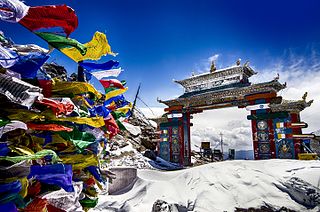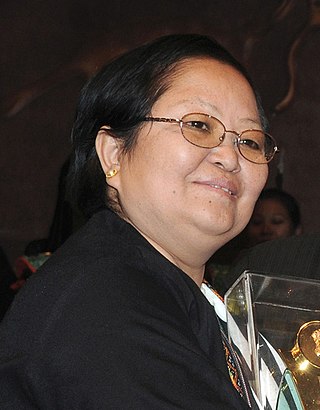
Arunachal Pradesh is a state in northeast India. It was formed from the North-East Frontier Agency (NEFA) region, and India declared it as a state on 20 February 1987. Itanagar is its capital and largest town. It borders the Indian states of Assam and Nagaland to the south. It shares international borders with Bhutan in the west, Myanmar in the east, and a disputed 1,129 km border with China's Tibet Autonomous Region in the north at the McMahon Line. Arunachal Pradesh is claimed by China as South Tibet as part of the Tibet Autonomous Region; China occupied some regions of Arunachal Pradesh in 1962 but later withdrew its forces.

Nagaland is a state in the north-eastern region of India. It is bordered by the Indian states of Arunachal Pradesh to the north, Assam to the west, Manipur to the south, and the Naga Self-Administered Zone of the Sagaing Region of Myanmar (Burma) to the east. Its capital city is Kohima and its largest city is the twin Chümoukedima–Dimapur. The state has an area of 16,579 square kilometres (6,401 sq mi) with a population of 1,980,602 as per the 2011 Census of India, making it one of the smallest states of India.

Northeast India, officially the North Eastern Region (NER), is the easternmost region of India representing both a geographic and political administrative division of the country. It comprises eight states—Arunachal Pradesh, Assam, Manipur, Meghalaya, Mizoram, Nagaland and Tripura, and the "brother" state of Sikkim.

Itanagar is the capital and largest town of the Indian state of Arunachal Pradesh. The seat of Arunachal Pradesh Legislative Assembly, the seat of government of Arunachal Pradesh, and the seat of Gauhati High Court permanent bench at Naharlagun are all in Itanagar. Being the hub of all the major economic bases, Itanagar, along with the adjacent town of Naharlagun, comprise the administrative region of the Itanagar Capital Complex Region. This stretches from the Itanagar Municipal limit at Chandranagar Town extended until Nirjuli Town, and is a major junction of cultural, economic, fashion, education and recreational activities.

The Apatani people are an ethnic group who live in the Ziro valley of Arunachal Pradesh's Lower Subansiri region.
The Indian state of Arunachal Pradesh has a total population of roughly 1.4 million on an area of 84,000 km2, amounting to a population density of about 17 pop./km2. The "indigenous groups" account for about two thirds of population, while immigrants, mostly of Bengali/Hindi belt origin, account for the remaining third.

Donyi Polo is the designation given to the indigenous religion, of animistic and shamanic type, of the Tani and other Sino-Tibetan peoples of Arunachal Pradesh and Assam in Northeast India. The name "Donyi-Polo" means "Sun-Moon", and was chosen for the religion in the process of its revitalisation and institutionalisation started in the 1970s in response to inroads made by Christianity and the possibility of absorption into Hinduism.

Nagas are various ethnic groups native to northeastern India and northwestern Myanmar. The groups have similar cultures and traditions, and form the majority of population in the Indian state of Nagaland and Naga Self-Administered Zone of Myanmar (Burma); with significant populations in Manipur, Arunachal Pradesh and Assam in India; Sagaing Region and Kachin State in Myanmar.
The Tani language, often referred to as Tani languages, encompasses a group of closely related languages spoken by the Tani people in the northeastern region of India, primarily in the state of Arunachal Pradesh and Assam. These languages belong to the Sino-Tibetan family and include several major dialects such as Nyishi, Galo, Apatani, Adi, Tagin, and Mising.

Mon District is a district of Nagaland, a state in India. It is the third-largest district in Nagaland in terms of area. The district has a population of 250,260 people. Mon Town is the headquarters of the district.
Bikram Grewal is an ornithologist, author, birdwatcher and conservationist from Delhi, India who has written several guides to Indian birds. His father was a senior civil servant in the Indian government. He has been working with governments and private groups to promote Eco-tourism in Madhya Pradesh, Arunachal and Nagaland. His 2002 book Birds of India has been a best-seller among Indian bird books. He has also been part of the Inheritance Series brought out by Sanctuary Asia.

The following outline is provided as an overview of, and topical guide to, India:

Tigmanshu Dhulia is an Indian film dialogue writer, director, actor, screenwriter, producer and casting director known for his works in Hindi cinema and Television. He wrote the dialogue for the 1998 film Dil Se.., the first Bollywood film to chart in the UK top ten, and screened at the Berlin International Film Festival. His directing career has also garnered international recognition with the biographical film, Paan Singh Tomar premiered at the 2010 BFI London Film Festival. and the thriller drama Saheb, Biwi Aur Gangster.
The Sal languages, also known as the Brahmaputran languages, are a branch of Tibeto-Burman languages spoken in northeast India, as well as parts of Bangladesh, Myanmar (Burma), and China.

The Eastern Fare Music Foundation is a music school, as well as a production and publishing house in Guwahati, Assam, India. The institute provides training for instrumental music in Western Classical music, Carnatic music and contemporary style. It was first founded in Bangalore in 2007. In 2016, the institute started its branches in Guwahati and Shillong. The branches in North East India provide classes in dance and Indian classical music.

The Nari Shakti Puraskar is an annual award given by the Ministry of Women and Child Development of the Government of India to individual women or to institutions that work towards the cause of women empowerment. It is the highest civilian honour for women in India, and is presented by the president of India on International Women's Day at Rashtrapati Bhavan in New Delhi. The award was instituted in 1999 under the title of Stree Shakti Puraskar, renamed and reorganised in 2015. It is awarded in six institutional and two individual categories, which carry a cash prize of 200,000 and 100,000 rupees, respectively.
Abhishek Ray is an Indian film composer, playback singer, instrumentalist, music arranger, and producer working in Bollywood. He is known for having composed the music and done playback vocals for popular and award-winning Bollywood films such as: Paan Singh Tomar, Welcome Back, Saheb, Biwi Aur Gangster, Wedding Anniversary, I Am Kalam, Shagird, Chaar Din Ki Chandni, Prem Mayee, Thoondil, Yeh Saali Zindagi, and Tera Kya Hoga Johnny. Apart from original music, his wildlife preservation and restoration efforts have been recognised across the world and he has been recently awarded with the '"Swabhiman Bharat "' for rewilding an entire hill as wild tiger-leopard corridor. Ray is known to have invested all his savings in creating the famous Sitabani Wildlife Reserve, India's first private wildlife reserve with wild tiger and leopard presence and home to about 350 bird species.

Binny Yanga was an Indian social worker, a member of the National Planning Commission of India and the founder of Oju Welfare Association (OWA), a non governmental organization based in Arunachal Pradesh, working for the welfare of the weaker sections of the society and campaigning against social Illnesses such as child marriage, forced marriage and dowry. She was honored by the Government of India, in 2012, with the fourth highest Indian civilian award of Padma Shri.
Lungwa, also known as Longwa, is a Konyak Naga village located in India and Myanmar (Burma) that straddles both sides in the Mon District of the Indian state of Nagaland and the Naga Self-Administered Zone of the Sagaing Region of Myanmar.













